Collections used in these examples:
EL 3.0 Expressions Examples
A. New Operators: '+' ,'=', ';'
-
#{x = 3}evaluates to: 3
-
#{y = x + 5}evaluates to: 8
-
#{z = y = x + 4}evaluates to: 7
-
#{0 += 0 +=0 += 1 += 1 += 0 += 0 += 0}evaluates to: 00011000
-
#{x += y}evaluates to: 37
-
#{"Rafael " += "Nadal " += "Parera"}evaluates to: Rafael Nadal Parera
-
#{x = 5; y = 3; z = x + y}evaluates to: 8
#{x = 3}evaluates to: 3
#{y = x + 5}evaluates to: 8
#{z = y = x + 4}evaluates to: 7
#{0 += 0 +=0 += 1 += 1 += 0 += 0 += 0}evaluates to: 00011000
#{x += y}evaluates to: 37
#{"Rafael " += "Nadal " += "Parera"}evaluates to: Rafael Nadal Parera
#{x = 5; y = 3; z = x + y}evaluates to: 8
B. Lambda Expression Invoked Immediately
-
#{(x->x+1)(3)}evaluates to: 4
-
#{((x,y)->x+y)(2,7)}evaluates to: 9
-
#{((x,y,z)->x-y*z)(1,7,3)}evaluates to: -20
-
#{((x,y)->x/y)(1,5)}evaluates to: 0.2
#{(x->x+1)(3)}evaluates to: 4
#{((x,y)->x+y)(2,7)}evaluates to: 9
#{((x,y,z)->x-y*z)(1,7,3)}evaluates to: -20
#{((x,y)->x/y)(1,5)}evaluates to: 0.2
C. Assigned Lambda Expression - Referenced and Invoked Indirectly
-
#{q = x->x+1; q(3)}evaluates to: 4
-
#{q = (x,y)->x+y; q(2,7)}evaluates to: 9
-
#{q = ((x,y,z)->x-y*z); q(1,7,3)}evaluates to: -20
-
#{q = ((x,y)->x/y); q(1,5)}evaluates to: 0.2
-
Factorial n recursive function:
#{fact = n -> n==0? 1: n*fact(n-1); fact(5)}evaluates to: 120
-
Compute n mod m without using %:
#{modulus = (n,m) -> m eq 0 ? 0 : (n lt m ? n: (modulus(n-m, m))); modulus(13,5)}evaluates to: 3
-
Greatest common divisor of 2 numbers (uses the above modulus function):
#{gcd = (n,m) -> modulus(n,m) == 0 ? m: (gcd(m, modulus(n,m))); gcd(10, 15)}evaluates to: 5
#{q = x->x+1; q(3)}evaluates to: 4
#{q = (x,y)->x+y; q(2,7)}evaluates to: 9
#{q = ((x,y,z)->x-y*z); q(1,7,3)}evaluates to: -20
#{q = ((x,y)->x/y); q(1,5)}evaluates to: 0.2
Factorial n recursive function:
#{fact = n -> n==0? 1: n*fact(n-1); fact(5)}evaluates to: 120
Compute n mod m without using %:
#{modulus = (n,m) -> m eq 0 ? 0 : (n lt m ? n: (modulus(n-m, m))); modulus(13,5)}evaluates to: 3
Greatest common divisor of 2 numbers (uses the above modulus function):
#{gcd = (n,m) -> modulus(n,m) == 0 ? m: (gcd(m, modulus(n,m))); gcd(10, 15)}evaluates to: 5
The methods listed below are called in sections D and E (this code is in LambdaBean):
public Object firstLambdaAction(LambdaExpression lambdaExpression) {
//useful in case of a custom ELContext
//or simply, default ELContext:
public Object secondLambdaAction(LambdaExpression lambdaExpression) {
FacesContext facesContext = FacesContext.getCurrentInstance();
Map<String, Object> args = new HashMap<>();
return result;
public Object thirdLambdaAction(LambdaExpression lambdaExpression) {
public Object firstLambdaAction(LambdaExpression lambdaExpression) {
//useful in case of a custom ELContext
FacesContext facesContext = FacesContext.getCurrentInstance();
ELContext elContext = facesContext.getELContext();
return lambdaExpression.invoke(elContext, 8, 3);
//or simply, default ELContext:
//return lambdaExpression.invoke(8, 3);
}
public Object secondLambdaAction(LambdaExpression lambdaExpression) {
FacesContext facesContext = FacesContext.getCurrentInstance();
ELContext elContext = facesContext.getELContext();
Map<String, Object> args = new HashMap<>();
args.put("n", 17);
args.put("m", 4);
elContext.enterLambdaScope(args);
Object result = lambdaExpression.invoke(elContext.isLambdaArgument("n") ?
elContext.getLambdaArgument("n") : 0, elContext.isLambdaArgument("m") ?
elContext.getLambdaArgument("m") : 0);
elContext.exitLambdaScope();
return result;
}
public Object thirdLambdaAction(LambdaExpression lambdaExpression) {
return lambdaExpression.invoke(10);
}
D. Lambda Expression Passed as an Argument to a Method
-
Call bean method named firstLambdaAction with lambda expression as argument:
#{lambdaBean.firstLambdaAction(modulus = (n,m) -> m eq 0 ? 0 : (n lt m ? n: (modulus(n-m, m))))}evaluates to: 2
-
Call bean method named secondLambdaAction with lambda expression as argument:
#{lambdaBean.secondLambdaAction(modulus = (n,m) -> m eq 0 ? 0 : (n lt m ? n: (modulus(n-m, m))))}evaluates to: 1
Call bean method named firstLambdaAction with lambda expression as argument:
#{lambdaBean.firstLambdaAction(modulus = (n,m) -> m eq 0 ? 0 : (n lt m ? n: (modulus(n-m, m))))}evaluates to: 2
Call bean method named secondLambdaAction with lambda expression as argument:
#{lambdaBean.secondLambdaAction(modulus = (n,m) -> m eq 0 ? 0 : (n lt m ? n: (modulus(n-m, m))))}evaluates to: 1
E. Nested Lambda Expressions
-
#{(x->x-((x,y)->(x+y))(4,3))(10)}evaluates to: 3
-
Call thirdLambdaAction with nested lambda expression as argument:
#{lambdaBean.thirdLambdaAction((x->x-((x,y)->(x+y))(4,3)))}evaluates to: 3
#{(x->x-((x,y)->(x+y))(4,3))(10)}evaluates to: 3
Call thirdLambdaAction with nested lambda expression as argument:
#{lambdaBean.thirdLambdaAction((x->x-((x,y)->(x+y))(4,3)))}evaluates to: 3
F. Lambda Streams - using Collections
-
Sort ascending/descending a list:
#{[21,23,12,444,9,1,45].stream().sorted((i,j)->i-j).toList()}ascending to [1, 9, 12, 21, 23, 45, 444]
#{[21,23,12,444,9,1,45].stream().sorted((i,j)->j-i).toList()}descending to [444, 45, 23, 21, 12, 9, 1]
-
Create an instance of java.lang.util.Set<Object> without displaying it:
#{nr_set = {1,2,3,4,5,6,7,8,9,10};''}evaluates to: it was created but not displayed!
Create an instance of java.lang.util.List<Object> without displaying it:
#{nr_list = [1,2,3,4,5,6,7,8,9,10];''}evaluates to: it was created but not displayed!
Create an instance of java.lang.util.Map<Object> without displaying it:
#{nr_map = {"one":1,"two":2,"three":3,"four":4,"five":5,"six":6,"seven":7,"eight":8,"nine":9,"ten":10};''}evaluates to: it was created but not displayed!
-
Display even values from nr_set Set:
#{nr_set.stream().filter(x-> x%2 == 0).toList()}evaluates to: [2, 4, 6, 8, 10]
-
Display values divisible by 5 from nr_list List
#{nr_list.stream().filter(x-> x%5 == 0).toList()}evaluates to: [5, 10]
-
Display key/value pairs from nr_map Map using ui:repeat and += operator (NO lambda expression):
<ui:repeat value="#{nr_map.entrySet().toArray()}" var="t"> #{t.key += "-" += t.value} </ui:repeat>evaluates to: nine-9 | six-6 | four-4 | one-1 | seven-7 | ten-10 | two-2 | three-3 | five-5 | eight-8 |
-
Display the nr_map values using values() method:
#{nr_map.values().stream().toList()}evaluates to: [9, 6, 4, 1, 7, 10, 2, 3, 5, 8]
-
Display the nr_map keys using keySet() method:
#{nr_map.keySet().stream().toList()}evaluates to: [nine, six, four, one, seven, ten, two, three, five, eight]
-
Display the nr_map keys/values using keySet() method:
#{nr_map.keySet().stream().map((x)->[x,nr_map.get(x)]).toList()}evaluates to: [[nine, 9], [six, 6], [four, 4], [one, 1], [seven, 7], [ten, 10], [two, 2], [three, 3], [five, 5], [eight, 8]]
-
Display the nr_map keys/values using entrySet() method:
#{nr_map.entrySet().stream().map((x)->[x.key, x.value]).toList()}evaluates to: [[nine, 9], [six, 6], [four, 4], [one, 1], [seven, 7], [ten, 10], [two, 2], [three, 3], [five, 5], [eight, 8]]
-
Filter even values from a java.lang.util.List<Object> and convert the result into an array:
for display use: <ui:repeat value="below_expression" var="t"> #{t += " | "} </ui:repeat>
#{[132,22,113,4454,345].stream().filter(x-> x%2 == 0).toArray()}evaluates to: 132 | 22 | 4454 |
-
Find first item in primes java.util.List:
#{lambdaBean.primes.stream().findFirst().get()}evaluates to: 11
-
Count number of items in primes java.util.List:
#{lambdaBean.primes.stream().count()}evaluates to: 10
-
Sum primes items in primes java.util.List:
#{lambdaBean.primes.stream().sum()}evaluates to: 129
-
Compute minimum item value in primes java.util.List:
#{lambdaBean.primes.stream().min().get()}evaluates to: 2
-
Compute average value in primes java.util.List:
#{lambdaBean.primes.stream().average().get()}evaluates to: 12.9
-
Compute maximum item value in primes java.util.List:
#{lambdaBean.primes.stream().max().get()}evaluates to: 29
-
Extract a sublist of primes java.util.List, between start, 2 and end, 6:
#{(lambdaBean.primes.stream().substream(2,6)).toList()}evaluates to: [5, 19, 2, 13]
-
Check that none of the languages (java.util.List) items is equal to Cobol text:
#{(lambdaBean.languages.stream().noneMatch(x->x.equals('Cobol')))}evaluates to: true
-
Check if all orders (java.util.List) items are equal to order#23200:
#{(lambdaBean.orders.stream().allMatch(x->x.equals('order#23200')))}evaluates to: true
-
Check if any item of languages (java.util.List) is equal to Scala text:
#{(lambdaBean.languages.stream().anyMatch(x->x.equals('Scala')))}evaluates to: true
-
Check if there are any costs less then 1000 in costBeforeVAT (java.util.List):
#{(lambdaBean.costBeforeVAT.stream().anyMatch(x->x lt 1000))}evaluates to: true
-
Sort and iterate the languages (java.util.List):
#{(lambdaBean.languages.stream().sorted()).toList()}evaluates to: [Accent, Basic, C++, Delphi, Fortran, Haskell, Inform, Java, Lisp, Onyx, Scala]
-
Display the first three biggest costs in costBeforeVAT (java.util.List):
#{(lambdaBean.costBeforeVAT.stream().sorted((x,y)->y-x).limit(3)).toList()}evaluates to: [15222, 10000, 2200]
-
Iterate distinct items from names (java.util.List):
#{(lambdaBean.names.stream().distinct()).toList()}evaluates to: [Mark, John, Nelly, Kelly, Raul, Molly, Sully]
-
Iterate distinct items in uppercase from names (java.util.List):
#{(lambdaBean.names.stream().map((name)->name.toUpperCase()).distinct()).toList()}evaluates to: [MARK, JOHN, NELLY, KELLY, RAUL, MOLLY, SULLY]
-
Display all names (allows duplicates) that ends with y in names (java.util.List):
#{(lambdaBean.names.stream().filter((name)->name.endsWith('y'))).toList()}evaluates to: [Nelly, Kelly, Kelly, Molly, Sully]
-
Display all names (allows duplicates) that starts with R in names (java.util.List):
#{(lambdaBean.names.stream().filter((name)->name.startsWith('R'))).toList()}evaluates to: [Raul]
-
Applying 24% VAT on each cost in costBeforeVAT (java.util.List):
#{(lambdaBean.costBeforeVAT.stream().map((cost) -> cost + .24*cost)).toList()}evaluates to: [42.16, 2728.0, 1674.0, 533.2, 70.68, 12400.0, 28.52, 18875.28, 1.24]
-
Sort languages (java.util.List) in the order of word length; and then for words of the same length, in alphabetical order:
#{lambdaBean.languages.stream().sorted((x,y)->(x.length()==y.length()? x.compareTo(y) : x.length() - y.length())).toList()}evaluates to: [C++, Java, Lisp, Onyx, Basic, Scala, Accent, Delphi, Inform, Fortran, Haskell]
-
Applying 24% VAT and compute total for costs in costBeforeVAT (java.util.List):
#{(lambdaBean.costBeforeVAT.stream().map((cost) -> cost + .24*cost)).reduce((sum, cost) -> sum + cost).get()}evaluates to: 36353.079999999994
-
Applying 24% VAT and compute total for costs bigger than 1000 in costBeforeVAT (java.util.List):
#{(lambdaBean.costBeforeVAT.stream().filter((cost)-> cost gt 1000).map((cost) -> cost + .24*cost)).reduce((sum, cost) -> sum + cost).get()}evaluates to: 35677.28
-
List all string with more than 3 characters toothless (java.util.List):
#{(lambdaBean.toothless.stream().filter((tooth) -> tooth.length()> 3)).toList()}evaluates to: [abcde, qwert, klmno]
-
Count number of appearances of age 28 in dataArrayList (java.util.ArrayList):
#{playersBean.dataArrayList.stream().filter((x)->x.age eq 28).toList().size()}evaluates to: 3
-
Sort ascending and display all players in dataArrayList (java.util.ArrayList) by name:
for display use: <ui:repeat value="below_expression" var="t"> #{t.player += " | "} </ui:repeat>
#{(playersBean.dataArrayList.stream().sorted((x,y)->x.player.compareTo(y.player))).toList()}evaluates to: ANDY MURRAY | DAVID FERRER | JO-WILFRIED TSONGA | JUAN MARTIN DEL POTRO | NOVAK DJOKOVIC | RAFAEL NADAL | RICHARD GASQUET | ROGER FEDERER | STANISLAS WAWRINKA | TOMAS BERDYCH |
-
Sort ascending and display all players in dataArrayList (java.util.ArrayList) by name using a function:
for display use: <ui:repeat value="below_expression" var="t"> #{t.player += " | "} </ui:repeat>
#{comparing = map->(x,y)->map(x).compareTo(map(y));''}
#{(playersBean.dataArrayList.stream().sorted(comparing((t)->t.player))).toList()}evaluates to: ANDY MURRAY | DAVID FERRER | JO-WILFRIED TSONGA | JUAN MARTIN DEL POTRO | NOVAK DJOKOVIC | RAFAEL NADAL | RICHARD GASQUET | ROGER FEDERER | STANISLAS WAWRINKA | TOMAS BERDYCH |
-
Sort descending and display all players in dataArrayList (java.util.ArrayList) by name:
for display use: <ui:repeat value="below_expression" var="t"> #{t.player += " | "} </ui:repeat>
#{(playersBean.dataArrayList.stream().sorted((x,y)->y.player.compareTo(x.player))).toList()}evaluates to: TOMAS BERDYCH | STANISLAS WAWRINKA | ROGER FEDERER | RICHARD GASQUET | RAFAEL NADAL | NOVAK DJOKOVIC | JUAN MARTIN DEL POTRO | JO-WILFRIED TSONGA | DAVID FERRER | ANDY MURRAY |
-
List all players older than 30 in dataArrayList (java.util.ArrayList):
for display use: <ui:repeat value="below_expression" var="t"> #{t.player += " | "} </ui:repeat>
#{(playersBean.dataArrayList.stream().filter((p)->p.age ge 30)).toList()}evaluates to: ROGER FEDERER | DAVID FERRER |
-
Extract, by name, all players in dataArrayList (java.util.ArrayList) using map :
for display use: <ui:repeat value="below_expression" var="t"> #{t += " | "} </ui:repeat>
#{playersBean.dataArrayList.stream().map((x)->x.player).toList()}evaluates to: NOVAK DJOKOVIC | RAFAEL NADAL | TOMAS BERDYCH | STANISLAS WAWRINKA | ANDY MURRAY | JUAN MARTIN DEL POTRO | JO-WILFRIED TSONGA | ROGER FEDERER | RICHARD GASQUET | DAVID FERRER |
-
Extract players by name, height and weight using map - only players older than 27 in dataArrayList (java.util.ArrayList):
for display use: <ui:repeat value="below_expression" var="t"> #{t[0] += ' is ' += (t[1]/100) += ' m height and weights ' += t[2] += ' kg'} </ui:repeat>
#{playersBean.dataArrayList.stream().filter((p)->p.age gt 27).map((p)->[p.player, p.height, p.weight]).toList()}evaluates to:
TOMAS BERDYCH is 1.96 m height and weights 91 kg
STANISLAS WAWRINKA is 1.83 m height and weights 81 kg
JO-WILFRIED TSONGA is 1.88 m height and weights 91 kg
ROGER FEDERER is 1.85 m height and weights 85 kg
DAVID FERRER is 1.75 m height and weights 73 kg
-
List all players in dataArrayList (java.util.ArrayList) with age between 27 and 29:
for display use: <ui:repeat value="below_expression" var="t"> #{t += " | "} </ui:repeat>
#{(playersBean.dataArrayList.stream().filter((p)->p.age ge 27).filter((p)->p.age le 29)).toList()}evaluates to: RAFAEL NADAL | TOMAS BERDYCH | STANISLAS WAWRINKA | JO-WILFRIED TSONGA | RICHARD GASQUET |
-
List all players in dataArrayList (java.util.ArrayList) born after 1985:
for display use: <ui:repeat value="below_expression" var="t"> #{t.player} born in #{t.born.year + 1900} </ui:repeat>
#{(playersBean.dataArrayList.stream().filter((p)->(p.born.year+1900) gt 1985)).toList()}evaluates to:
NOVAK DJOKOVIC born in 1987
RAFAEL NADAL born in 1986
ANDY MURRAY born in 1987
JUAN MARTIN DEL POTRO born in 1988
RICHARD GASQUET born in 1986
-
Display the youngest and the oldest player in dataArrayList (java.util.ArrayList):
Youngest:#{playersBean.dataArrayList.stream().max((x,y)->y.age-x.age).get().player}Oldest:#{playersBean.dataArrayList.stream().max((x,y)->x.age-y.age).get().player}evaluates to:
Youngest: JUAN MARTIN DEL POTRO
Oldest: ROGER FEDERER
-
Display the longest player name in dataArrayList (java.util.ArrayList):
#{playersBean.dataArrayList.stream().max((x,y)->x.player.length()-(y.player.length())).get().player}evaluates to: JUAN MARTIN DEL POTRO
-
Display players names from dataHashMap (java.util.Map) using values() method:
#{playersBean.dataHashMap.values().stream().map((x)->x.player).toList()}evaluates to: [RAFAEL NADAL, NOVAK DJOKOVIC, DAVID FERRER, ANDY MURRAY, JUAN MARTIN DEL POTRO, ROGER FEDERER, TOMAS BERDYCH, STANISLAS WAWRINKA, RICHARD GASQUET, JO-WILFRIED TSONGA]
-
Display players keys from dataHashMap (java.util.Map) using keySet() method:
#{playersBean.dataHashMap.keySet().stream().toList()}evaluates to: [1, 2, 3, 4, 5, 6, 7, 8, 9, 10]
-
Display players heights from dataHashMap (java.util.Map) using keySet() method:
#{playersBean.dataHashMap.keySet().stream().map((x)->[x,playersBean.dataHashMap.get(x).height]).toList()}evaluates to: [[1, 185], [2, 188], [3, 175], [4, 190], [5, 198], [6, 185], [7, 196], [8, 183], [9, 185], [10, 188]]
-
Display players keys/names from dataHashMap (java.util.Map) using entrySet() method:
#{playersBean.dataHashMap.entrySet().stream().map((x)->[x.key, x.value.player]).toList()}evaluates to: [[1, RAFAEL NADAL], [2, NOVAK DJOKOVIC], [3, DAVID FERRER], [4, ANDY MURRAY], [5, JUAN MARTIN DEL POTRO], [6, ROGER FEDERER], [7, TOMAS BERDYCH], [8, STANISLAS WAWRINKA], [9, RICHARD GASQUET], [10, JO-WILFRIED TSONGA]]
-
Display players names sorted by key from dataHashMap (java.util.Map) using entrySet() method:
#{playersBean.dataHashMap.entrySet().stream().sorted((x,y)->x.key-y.key).map((x)->[x.key,x.value.player]).toList()}evaluates to: [[1, RAFAEL NADAL], [2, NOVAK DJOKOVIC], [3, DAVID FERRER], [4, ANDY MURRAY], [5, JUAN MARTIN DEL POTRO], [6, ROGER FEDERER], [7, TOMAS BERDYCH], [8, STANISLAS WAWRINKA], [9, RICHARD GASQUET], [10, JO-WILFRIED TSONGA]]
-
Display players names sorted by names from dataHashMap (java.util.Map) using entrySet() method:
#{playersBean.dataHashMap.entrySet().stream().sorted((x,y)->x.value.player.compareTo(y.value.player)).map((x)->[x.key,x.value.player]).toList()}evaluates to: [[4, ANDY MURRAY], [3, DAVID FERRER], [10, JO-WILFRIED TSONGA], [5, JUAN MARTIN DEL POTRO], [2, NOVAK DJOKOVIC], [1, RAFAEL NADAL], [9, RICHARD GASQUET], [6, ROGER FEDERER], [8, STANISLAS WAWRINKA], [7, TOMAS BERDYCH]]
-
Display players from dataHashMap (java.util.Map), sorted by birthday, using entrySet() method:
#{playersBean.dataHashMap.entrySet().stream().sorted((x,y)->x.value.born.compareTo(y.value.born)).map((x)->[x.key,x.value.player,x.value.born.year+1900]).toList()}evaluates to: [[6, ROGER FEDERER, 1981], [3, DAVID FERRER, 1982], [8, STANISLAS WAWRINKA, 1985], [10, JO-WILFRIED TSONGA, 1985], [7, TOMAS BERDYCH, 1985], [1, RAFAEL NADAL, 1986], [9, RICHARD GASQUET, 1986], [4, ANDY MURRAY, 1987], [2, NOVAK DJOKOVIC, 1987], [5, JUAN MARTIN DEL POTRO, 1988]]
-
Compute the youngest player from dataHashMap (java.util.Map) using values() method:
#{(playersBean.dataHashMap.values().stream().max((x,y)->y.age-x.age).get()).player}evaluates to: JUAN MARTIN DEL POTRO
-
Compute the oldest player from dataHashMap (java.util.Map) using values() method:
#{(playersBean.dataHashMap.values().stream().max((x,y)->x.age-y.age).get()).player}evaluates to: ROGER FEDERER
-
Display the players from dataHashMap (java.util.Map) using entrySet() method - only players with odd keys and starting with R:
for display use: <ui:repeat value="below_expression" var="t"> #{t.key += "-" += t.value.player} </ui:repeat>
#{((playersBean.dataHashMap.entrySet().stream().filter((x)->x.key%2 ne 0)).filter((x)->x.value.player.startsWith('R'))).toList()}evaluates to:
1-RAFAEL NADAL
9-RICHARD GASQUET
Sort ascending/descending a list:
#{[21,23,12,444,9,1,45].stream().sorted((i,j)->i-j).toList()}ascending to [1, 9, 12, 21, 23, 45, 444]
#{[21,23,12,444,9,1,45].stream().sorted((i,j)->j-i).toList()}descending to [444, 45, 23, 21, 12, 9, 1]
Create an instance of java.lang.util.Set<Object> without displaying it:
#{nr_set = {1,2,3,4,5,6,7,8,9,10};''}evaluates to: it was created but not displayed!
Create an instance of java.lang.util.List<Object> without displaying it:
#{nr_list = [1,2,3,4,5,6,7,8,9,10];''}evaluates to: it was created but not displayed!
Create an instance of java.lang.util.Map<Object> without displaying it:
#{nr_map = {"one":1,"two":2,"three":3,"four":4,"five":5,"six":6,"seven":7,"eight":8,"nine":9,"ten":10};''}evaluates to: it was created but not displayed!
Display even values from nr_set Set:
#{nr_set.stream().filter(x-> x%2 == 0).toList()}evaluates to: [2, 4, 6, 8, 10]
Display values divisible by 5 from nr_list List
#{nr_list.stream().filter(x-> x%5 == 0).toList()}evaluates to: [5, 10]
Display key/value pairs from nr_map Map using ui:repeat and += operator (NO lambda expression):
<ui:repeat value="#{nr_map.entrySet().toArray()}" var="t"> #{t.key += "-" += t.value} </ui:repeat>evaluates to: nine-9 | six-6 | four-4 | one-1 | seven-7 | ten-10 | two-2 | three-3 | five-5 | eight-8 |
Display the nr_map values using values() method:
#{nr_map.values().stream().toList()}evaluates to: [9, 6, 4, 1, 7, 10, 2, 3, 5, 8]
Display the nr_map keys using keySet() method:
#{nr_map.keySet().stream().toList()}evaluates to: [nine, six, four, one, seven, ten, two, three, five, eight]
Display the nr_map keys/values using keySet() method:
#{nr_map.keySet().stream().map((x)->[x,nr_map.get(x)]).toList()}evaluates to: [[nine, 9], [six, 6], [four, 4], [one, 1], [seven, 7], [ten, 10], [two, 2], [three, 3], [five, 5], [eight, 8]]
Display the nr_map keys/values using entrySet() method:
#{nr_map.entrySet().stream().map((x)->[x.key, x.value]).toList()}evaluates to: [[nine, 9], [six, 6], [four, 4], [one, 1], [seven, 7], [ten, 10], [two, 2], [three, 3], [five, 5], [eight, 8]]
Filter even values from a java.lang.util.List<Object> and convert the result into an array:
for display use: <ui:repeat value="below_expression" var="t"> #{t += " | "} </ui:repeat>
#{[132,22,113,4454,345].stream().filter(x-> x%2 == 0).toArray()}evaluates to: 132 | 22 | 4454 |
Find first item in primes java.util.List:
#{lambdaBean.primes.stream().findFirst().get()}evaluates to: 11
Count number of items in primes java.util.List:
#{lambdaBean.primes.stream().count()}evaluates to: 10
Sum primes items in primes java.util.List:
#{lambdaBean.primes.stream().sum()}evaluates to: 129
Compute minimum item value in primes java.util.List:
#{lambdaBean.primes.stream().min().get()}evaluates to: 2
Compute average value in primes java.util.List:
#{lambdaBean.primes.stream().average().get()}evaluates to: 12.9
Compute maximum item value in primes java.util.List:
#{lambdaBean.primes.stream().max().get()}evaluates to: 29
Extract a sublist of primes java.util.List, between start, 2 and end, 6:
#{(lambdaBean.primes.stream().substream(2,6)).toList()}evaluates to: [5, 19, 2, 13]
Check that none of the languages (java.util.List) items is equal to Cobol text:
#{(lambdaBean.languages.stream().noneMatch(x->x.equals('Cobol')))}evaluates to: true
Check if all orders (java.util.List) items are equal to order#23200:
#{(lambdaBean.orders.stream().allMatch(x->x.equals('order#23200')))}evaluates to: true
Check if any item of languages (java.util.List) is equal to Scala text:
#{(lambdaBean.languages.stream().anyMatch(x->x.equals('Scala')))}evaluates to: true
Check if there are any costs less then 1000 in costBeforeVAT (java.util.List):
#{(lambdaBean.costBeforeVAT.stream().anyMatch(x->x lt 1000))}evaluates to: true
Sort and iterate the languages (java.util.List):
#{(lambdaBean.languages.stream().sorted()).toList()}evaluates to: [Accent, Basic, C++, Delphi, Fortran, Haskell, Inform, Java, Lisp, Onyx, Scala]
Display the first three biggest costs in costBeforeVAT (java.util.List):
#{(lambdaBean.costBeforeVAT.stream().sorted((x,y)->y-x).limit(3)).toList()}evaluates to: [15222, 10000, 2200]
Iterate distinct items from names (java.util.List):
#{(lambdaBean.names.stream().distinct()).toList()}evaluates to: [Mark, John, Nelly, Kelly, Raul, Molly, Sully]
Iterate distinct items in uppercase from names (java.util.List):
#{(lambdaBean.names.stream().map((name)->name.toUpperCase()).distinct()).toList()}evaluates to: [MARK, JOHN, NELLY, KELLY, RAUL, MOLLY, SULLY]
Display all names (allows duplicates) that ends with y in names (java.util.List):
#{(lambdaBean.names.stream().filter((name)->name.endsWith('y'))).toList()}evaluates to: [Nelly, Kelly, Kelly, Molly, Sully]
Display all names (allows duplicates) that starts with R in names (java.util.List):
#{(lambdaBean.names.stream().filter((name)->name.startsWith('R'))).toList()}evaluates to: [Raul]
Applying 24% VAT on each cost in costBeforeVAT (java.util.List):
#{(lambdaBean.costBeforeVAT.stream().map((cost) -> cost + .24*cost)).toList()}evaluates to: [42.16, 2728.0, 1674.0, 533.2, 70.68, 12400.0, 28.52, 18875.28, 1.24]
Sort languages (java.util.List) in the order of word length; and then for words of the same length, in alphabetical order:
#{lambdaBean.languages.stream().sorted((x,y)->(x.length()==y.length()? x.compareTo(y) : x.length() - y.length())).toList()}evaluates to: [C++, Java, Lisp, Onyx, Basic, Scala, Accent, Delphi, Inform, Fortran, Haskell]
Applying 24% VAT and compute total for costs in costBeforeVAT (java.util.List):
#{(lambdaBean.costBeforeVAT.stream().map((cost) -> cost + .24*cost)).reduce((sum, cost) -> sum + cost).get()}evaluates to: 36353.079999999994
Applying 24% VAT and compute total for costs bigger than 1000 in costBeforeVAT (java.util.List):
#{(lambdaBean.costBeforeVAT.stream().filter((cost)-> cost gt 1000).map((cost) -> cost + .24*cost)).reduce((sum, cost) -> sum + cost).get()}evaluates to: 35677.28
List all string with more than 3 characters toothless (java.util.List):
#{(lambdaBean.toothless.stream().filter((tooth) -> tooth.length()> 3)).toList()}evaluates to: [abcde, qwert, klmno]
Count number of appearances of age 28 in dataArrayList (java.util.ArrayList):
#{playersBean.dataArrayList.stream().filter((x)->x.age eq 28).toList().size()}evaluates to: 3
Sort ascending and display all players in dataArrayList (java.util.ArrayList) by name:
for display use: <ui:repeat value="below_expression" var="t"> #{t.player += " | "} </ui:repeat>
#{(playersBean.dataArrayList.stream().sorted((x,y)->x.player.compareTo(y.player))).toList()}evaluates to: ANDY MURRAY | DAVID FERRER | JO-WILFRIED TSONGA | JUAN MARTIN DEL POTRO | NOVAK DJOKOVIC | RAFAEL NADAL | RICHARD GASQUET | ROGER FEDERER | STANISLAS WAWRINKA | TOMAS BERDYCH |
Sort ascending and display all players in dataArrayList (java.util.ArrayList) by name using a function:
for display use: <ui:repeat value="below_expression" var="t"> #{t.player += " | "} </ui:repeat>
#{comparing = map->(x,y)->map(x).compareTo(map(y));''}
#{(playersBean.dataArrayList.stream().sorted(comparing((t)->t.player))).toList()}evaluates to: ANDY MURRAY | DAVID FERRER | JO-WILFRIED TSONGA | JUAN MARTIN DEL POTRO | NOVAK DJOKOVIC | RAFAEL NADAL | RICHARD GASQUET | ROGER FEDERER | STANISLAS WAWRINKA | TOMAS BERDYCH |
#{(playersBean.dataArrayList.stream().sorted(comparing((t)->t.player))).toList()}evaluates to: ANDY MURRAY | DAVID FERRER | JO-WILFRIED TSONGA | JUAN MARTIN DEL POTRO | NOVAK DJOKOVIC | RAFAEL NADAL | RICHARD GASQUET | ROGER FEDERER | STANISLAS WAWRINKA | TOMAS BERDYCH |
Sort descending and display all players in dataArrayList (java.util.ArrayList) by name:
for display use: <ui:repeat value="below_expression" var="t"> #{t.player += " | "} </ui:repeat>
#{(playersBean.dataArrayList.stream().sorted((x,y)->y.player.compareTo(x.player))).toList()}evaluates to: TOMAS BERDYCH | STANISLAS WAWRINKA | ROGER FEDERER | RICHARD GASQUET | RAFAEL NADAL | NOVAK DJOKOVIC | JUAN MARTIN DEL POTRO | JO-WILFRIED TSONGA | DAVID FERRER | ANDY MURRAY |
List all players older than 30 in dataArrayList (java.util.ArrayList):
for display use: <ui:repeat value="below_expression" var="t"> #{t.player += " | "} </ui:repeat>
#{(playersBean.dataArrayList.stream().filter((p)->p.age ge 30)).toList()}evaluates to: ROGER FEDERER | DAVID FERRER |
Extract, by name, all players in dataArrayList (java.util.ArrayList) using map :
for display use: <ui:repeat value="below_expression" var="t"> #{t += " | "} </ui:repeat>
#{playersBean.dataArrayList.stream().map((x)->x.player).toList()}evaluates to: NOVAK DJOKOVIC | RAFAEL NADAL | TOMAS BERDYCH | STANISLAS WAWRINKA | ANDY MURRAY | JUAN MARTIN DEL POTRO | JO-WILFRIED TSONGA | ROGER FEDERER | RICHARD GASQUET | DAVID FERRER |
Extract players by name, height and weight using map - only players older than 27 in dataArrayList (java.util.ArrayList):
for display use: <ui:repeat value="below_expression" var="t"> #{t[0] += ' is ' += (t[1]/100) += ' m height and weights ' += t[2] += ' kg'} </ui:repeat>
#{playersBean.dataArrayList.stream().filter((p)->p.age gt 27).map((p)->[p.player, p.height, p.weight]).toList()}evaluates to:
TOMAS BERDYCH is 1.96 m height and weights 91 kg
STANISLAS WAWRINKA is 1.83 m height and weights 81 kg
JO-WILFRIED TSONGA is 1.88 m height and weights 91 kg
ROGER FEDERER is 1.85 m height and weights 85 kg
DAVID FERRER is 1.75 m height and weights 73 kg
TOMAS BERDYCH is 1.96 m height and weights 91 kg
STANISLAS WAWRINKA is 1.83 m height and weights 81 kg
JO-WILFRIED TSONGA is 1.88 m height and weights 91 kg
ROGER FEDERER is 1.85 m height and weights 85 kg
DAVID FERRER is 1.75 m height and weights 73 kg
List all players in dataArrayList (java.util.ArrayList) with age between 27 and 29:
for display use: <ui:repeat value="below_expression" var="t"> #{t += " | "} </ui:repeat>
#{(playersBean.dataArrayList.stream().filter((p)->p.age ge 27).filter((p)->p.age le 29)).toList()}evaluates to: RAFAEL NADAL | TOMAS BERDYCH | STANISLAS WAWRINKA | JO-WILFRIED TSONGA | RICHARD GASQUET |
List all players in dataArrayList (java.util.ArrayList) born after 1985:
for display use: <ui:repeat value="below_expression" var="t"> #{t.player} born in #{t.born.year + 1900} </ui:repeat>
#{(playersBean.dataArrayList.stream().filter((p)->(p.born.year+1900) gt 1985)).toList()}evaluates to:
NOVAK DJOKOVIC born in 1987
RAFAEL NADAL born in 1986
ANDY MURRAY born in 1987
JUAN MARTIN DEL POTRO born in 1988
RICHARD GASQUET born in 1986
NOVAK DJOKOVIC born in 1987
RAFAEL NADAL born in 1986
ANDY MURRAY born in 1987
JUAN MARTIN DEL POTRO born in 1988
RICHARD GASQUET born in 1986
Display the youngest and the oldest player in dataArrayList (java.util.ArrayList):
Youngest:#{playersBean.dataArrayList.stream().max((x,y)->y.age-x.age).get().player}Oldest:#{playersBean.dataArrayList.stream().max((x,y)->x.age-y.age).get().player}evaluates to:
Youngest: JUAN MARTIN DEL POTRO
Oldest: ROGER FEDERER
Youngest: JUAN MARTIN DEL POTRO
Oldest: ROGER FEDERER
Display the longest player name in dataArrayList (java.util.ArrayList):
#{playersBean.dataArrayList.stream().max((x,y)->x.player.length()-(y.player.length())).get().player}evaluates to: JUAN MARTIN DEL POTRO
Display players names from dataHashMap (java.util.Map) using values() method:
#{playersBean.dataHashMap.values().stream().map((x)->x.player).toList()}evaluates to: [RAFAEL NADAL, NOVAK DJOKOVIC, DAVID FERRER, ANDY MURRAY, JUAN MARTIN DEL POTRO, ROGER FEDERER, TOMAS BERDYCH, STANISLAS WAWRINKA, RICHARD GASQUET, JO-WILFRIED TSONGA]
Display players keys from dataHashMap (java.util.Map) using keySet() method:
#{playersBean.dataHashMap.keySet().stream().toList()}evaluates to: [1, 2, 3, 4, 5, 6, 7, 8, 9, 10]
Display players heights from dataHashMap (java.util.Map) using keySet() method:
#{playersBean.dataHashMap.keySet().stream().map((x)->[x,playersBean.dataHashMap.get(x).height]).toList()}evaluates to: [[1, 185], [2, 188], [3, 175], [4, 190], [5, 198], [6, 185], [7, 196], [8, 183], [9, 185], [10, 188]]
Display players keys/names from dataHashMap (java.util.Map) using entrySet() method:
#{playersBean.dataHashMap.entrySet().stream().map((x)->[x.key, x.value.player]).toList()}evaluates to: [[1, RAFAEL NADAL], [2, NOVAK DJOKOVIC], [3, DAVID FERRER], [4, ANDY MURRAY], [5, JUAN MARTIN DEL POTRO], [6, ROGER FEDERER], [7, TOMAS BERDYCH], [8, STANISLAS WAWRINKA], [9, RICHARD GASQUET], [10, JO-WILFRIED TSONGA]]
Display players names sorted by key from dataHashMap (java.util.Map) using entrySet() method:
#{playersBean.dataHashMap.entrySet().stream().sorted((x,y)->x.key-y.key).map((x)->[x.key,x.value.player]).toList()}evaluates to: [[1, RAFAEL NADAL], [2, NOVAK DJOKOVIC], [3, DAVID FERRER], [4, ANDY MURRAY], [5, JUAN MARTIN DEL POTRO], [6, ROGER FEDERER], [7, TOMAS BERDYCH], [8, STANISLAS WAWRINKA], [9, RICHARD GASQUET], [10, JO-WILFRIED TSONGA]]
Display players names sorted by names from dataHashMap (java.util.Map) using entrySet() method:
#{playersBean.dataHashMap.entrySet().stream().sorted((x,y)->x.value.player.compareTo(y.value.player)).map((x)->[x.key,x.value.player]).toList()}evaluates to: [[4, ANDY MURRAY], [3, DAVID FERRER], [10, JO-WILFRIED TSONGA], [5, JUAN MARTIN DEL POTRO], [2, NOVAK DJOKOVIC], [1, RAFAEL NADAL], [9, RICHARD GASQUET], [6, ROGER FEDERER], [8, STANISLAS WAWRINKA], [7, TOMAS BERDYCH]]
Display players from dataHashMap (java.util.Map), sorted by birthday, using entrySet() method:
#{playersBean.dataHashMap.entrySet().stream().sorted((x,y)->x.value.born.compareTo(y.value.born)).map((x)->[x.key,x.value.player,x.value.born.year+1900]).toList()}evaluates to: [[6, ROGER FEDERER, 1981], [3, DAVID FERRER, 1982], [8, STANISLAS WAWRINKA, 1985], [10, JO-WILFRIED TSONGA, 1985], [7, TOMAS BERDYCH, 1985], [1, RAFAEL NADAL, 1986], [9, RICHARD GASQUET, 1986], [4, ANDY MURRAY, 1987], [2, NOVAK DJOKOVIC, 1987], [5, JUAN MARTIN DEL POTRO, 1988]]
Compute the youngest player from dataHashMap (java.util.Map) using values() method:
#{(playersBean.dataHashMap.values().stream().max((x,y)->y.age-x.age).get()).player}evaluates to: JUAN MARTIN DEL POTRO
Compute the oldest player from dataHashMap (java.util.Map) using values() method:
#{(playersBean.dataHashMap.values().stream().max((x,y)->x.age-y.age).get()).player}evaluates to: ROGER FEDERER
Display the players from dataHashMap (java.util.Map) using entrySet() method - only players with odd keys and starting with R:
for display use: <ui:repeat value="below_expression" var="t"> #{t.key += "-" += t.value.player} </ui:repeat>
#{((playersBean.dataHashMap.entrySet().stream().filter((x)->x.key%2 ne 0)).filter((x)->x.value.player.startsWith('R'))).toList()}evaluates to:
1-RAFAEL NADAL
9-RICHARD GASQUET
1-RAFAEL NADAL
9-RICHARD GASQUET
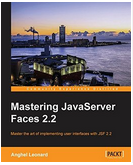
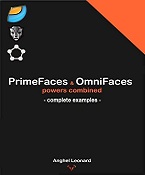
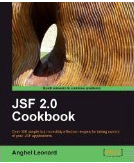
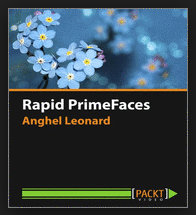





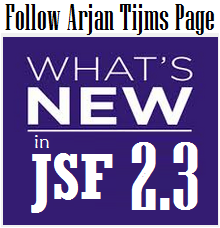

 Arrays
Arrays Converters
Converters
 JSF 2 Tutorials at www.mkyong.com
JSF 2 Tutorials at www.mkyong.com  JavaServer Faces (JSF) Tutorial
JavaServer Faces (JSF) Tutorial 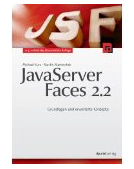
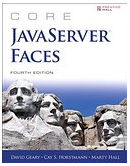
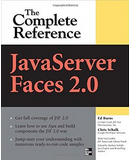
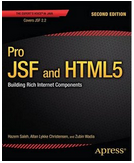

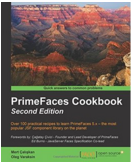


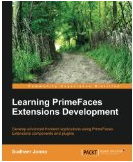

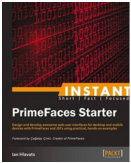

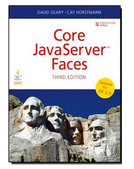

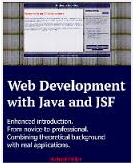
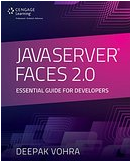

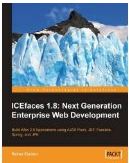




Niciun comentariu :
Trimiteți un comentariu